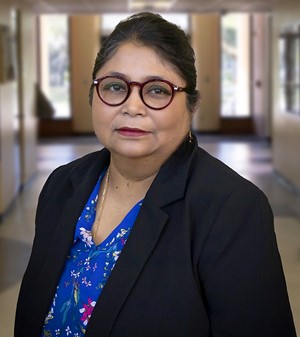IEEE Oregon Nanotech Lecture: Spintronics Beyond Memory Operations
IEEE Oregon Nanotechnology Chapter presents
Spintronics Beyond Memory Operations
with Dr. Sanjukta Bhanja, University of South Florida, IEEE Nanotechnology Council Distinguished Lecturer
Date/Time: January 27,2025, 12:00 - 1:20 pm
Location: Hybrid, from Cramer Hall 171, Portland State University, 1721 SW Broadway, Portland, OR 97201
This talk explores the multifaceted capabilities of spintronic memory systems, encompassing in-memory processing, security applications, and solving complex optimization problems. These advancements can potentially reshape the computing landscape by providing more efficient, secure, and accessible computational solutions. It will be structured into two key segments: The first part of the talk focuses on the concept of processing within the memory itself, utilizing racetrack technology. The second aspect addresses the intriguing concept of using dipolar coupling between memory elements for information processing and transfer.
Date and Time
Location
Hosts
Registration
-
 Add Event to Calendar
Add Event to Calendar
Loading virtual attendance info...
- Portland State University
- 1721 SW Broadway
- Portland, Oregon
- United States 97201
- Building: Cramer Hall
- Room Number: 171
- Contact Event Host
- Co-sponsored by Portland State University Physics Department
Speakers
Sanjukta Bhanja
Spintronics Beyond Memory Operations
This talk explores the multifaceted capabilities of spintronic memory systems, encompassing in-memory processing, security applications, and solving complex optimization problems. These advancements can potentially reshape the computing landscape by providing more efficient, secure, and accessible computational solutions. It will be structured into two key segments: The first part of the talk focuses on the concept of processing within the memory itself, utilizing racetrack technology. This involves harnessing the signatures from multiple memory cells to perform computational tasks directly within the memory array. This innovative approach streamlines the data processing pipeline and explores the computational capacity inherent in the memory hardware. The second aspect addresses the intriguing concept of using dipolar coupling between memory elements for information processing and transfer. By exploiting the interactions between memory elements, novel opportunities for performing computations and data transfer emerge. This can lead to more efficient and versatile computing systems. The presentation's second part delves into applying spintronic memory as physically unclonable functions (PUFs). These PUFs can generate unique and unforgeable security primitives, bolstering hardware security. This can enhance the security of various systems and applications, making them more resistant to unauthorized access or tampering.
Biography:

Sanjukta Bhanja's research spans VLSI, nano-electronics, and applied physics, with external sponsorship from the National Science Foundation and NASA. She has graduated 12 Ph.D. graduates who've excelled in high-tech industries and advises four doctoral students. Her creative works are published in top-tier peer-reviewed journals and conferences, including high-impact journals such as Nature Nanotechnology. She has been an Associate Editor of the IEEE Transactions on VLSI Systems and ACM Journal on Emerging Technologies in Computing Systems. Besides serving on various IEEE and ACM conferences' Technical Program Committees (TPC), she has assumed leadership roles in Conference organization and steering committees. She organized a National Science Foundation-sponsored conference on ''Field-coupled Nano-computing'' that created a roadmap and evaluated research progress in Field-coupled computing. Her accolades include the NSF CAREER Award, "Outstanding Faculty Research Achievement Award" from USF, Outstanding Undergraduate Teaching recognition, the F.E.F William Jones Outstanding Mentor Award, and certification as an Executive Leadership Fellow in the ELATES at Drexel® program for 2020-2021.
Address:College of Engineering, University of South Florida, Tampa, Florida, United States, 33620
Agenda
12:00 pm Introduction of Speaker
1:20 pm End

